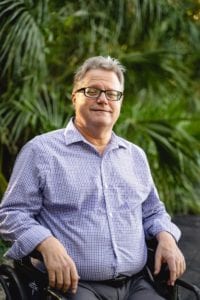|
Getting your Trinity Audio player ready...
|

Mayor Cunningham, Vice Mayor Tellam, Council Members Fiore and Matson, former Vice Mayor Dubois, judges, honored guests, and my fellow citizens, we have gathered this afternoon in celebration of the democratic process.
There are so many people that I want and need to thank for how hard they worked on my election. My campaign manager, Pedro Diaz with Diaz Campaigns, is a young man who I’ve worked with on many campaigns over the years. He came up with a strategy to get the word out where we knew we’d be far outspent. He’s here with his father, Rene Diaz
My friends former Mayor Shelley Stancyk and Gary Pastorella not only spoke out on my behalf, but they made sure that my signs were placed in yards far and wide across the Village. Stacey Lawrence and David Zisman volunteered, going places that my wheelchair would not take me. My brother, Bobby Brown not only lent me his support, he put one of my signs in his yard that fronts Old Cutler Road.
My kids, Chris, Mike, and Ash all supported me. And I am especially grateful to my son, Nick, who watched out over me and moved me from place to place. He was both my wings and my legs.
I am grateful to Karyn Cunningham and Marsha Matson for their early support and for their service to our Village. Watching them, I know that service can be rewarding, but it can also be thankless.
During the run-up to qualifying, our mailboxes, both physical and email, were stuffed with hit pieces. “Nastygrams” as I dubbed them. They weren’t aimed at anyone on the ballot. They were sent, not as form of honest debate and discussion, but to malign and defame.
For such a quiet and quaint Village, Palmetto Bay practices politics with both sharp elbows and sharpened knives.
As I was considering making a last-minute run for District 2, someone who I had confided in warned me that those with special interests would come after me.
And it turned out they were right. Anonymous nastygrams were sent out about me, too.
Here’s where my head was at at that moment. I lost my wife, my beloved Rita, in the summer of 2019. One year later, I developed an unfelt infection in my leg that caused an amputation in my right foot. This year, I was diagnosed twice with COVID-19.
I stopped and thought to myself: what could anyone do to me that was worse than what I had already been through, what I had already survived? The answer was nothing.
That’s when I got my qualifying paperwork together and went down and met Missy Arocha, our Village Clerk. I got my stuff in with about a half hour to spare.
I found out after I won that this job comes with both polo shirts and a cell phone. I want to make that number widely available so that any Palmetto Bay resident can call me with any questions or concerns.
If you get a new nastygram about me or about any issue facing the Village, call me. Talk to me. I did this so I can represent your interests, not those with money enough to waste, about $3,000 for each nastygram.
I didn’t take any developer money. Most of my contributions were small. I relied on my friends and family. I want to give a shout out to my sisters, Kathy Cody-Gaustella, Kelley Cody-Grimm, and Sharon Cody-Rentz, and to my brother, Bill Cody.
Tonight, I’m going to be sitting up on the dais for the first time. And I know that over the course of the next four years, there will be times when I am in the minority, when the majority of the Council does not vote with me. And I can promise you that when that happens, I will look to my right and say in a loud, clear voice:
“Madame Mayor, what’s next?”
I’m especially grateful to my wife, Rita Herrera-Cody. I met her in the summer of 1978. I had just graduated from FSU and was working at JCPenney’s in Dadeland selling cameras, but headed off to law school. Rita had just been hired to work in women’s lingerie. On her first day on the job, we rode up the elevator together. She dropped her purse and I helped her pick up the scattered contents.
That night, she went home to her roommates and told them she had just met the man she was going to marry.
I didn’t know. The next day, I was busy at closing. A group of Saudi women had come in and bought out every camera we had in stock. Over fifty thousand dollars in 1978 or over $200,000 today. I needed to get my money upstairs. But I also needed to clean the department.
Just then, Rita was walking by, headed to the office with her register pouch. She was a tall strawberry blonde with a ponytail that swung side to side. She had high cheeks and eyes that flashed green when she smiled.
I called her over. And I asked her a question.
“Marry me?”
Her eyes flashed green and she gave me such a smile.
“Okay,” I said, “Take my money upstairs and we’ll decide what to name the children later.”
She did as I asked.
We started dating after that. You’d be surprised how easy it is to ask someone to dinner after you’ve proposed to them, even in jest.
I am convinced that boys don’t become men until they’re in their mid-twenties. Girls become women at a much younger age. Boys live in the moment. At about 10, 11, or 12 girls are given an appreciation for heights and lows of the passage of time.
From that moment, we were nearly inseparable. Rita and I were supposed to have a summer fling. But summer didn’t end. We married. We bought the house we raised our family in in what would someday become Palmetto Bay. We were together for just short of 41 years.
Then on a Friday evening in June 2019, after we had babysat our granddaughter, Olivia, we had dinner. Rita watched the news and I went to do some work in my home office. A few hours later, she came into my office complaining of chest pains.
I didn’t wait to call for an ambulance, I put her in my car and got her to Jackson South in minutes. The diagnosis was that she had a tear in her aorta. We were taken by ambulance to Jackson Main where she was prepped for surgery.
We had our last conversation that night. She told me that she didn’t want me to be alone.
I assured her that since it was almost midnight, I told the kids to stay at home. But they’d be in to see her in the morning.
“No,” she said, looking more serious than I had ever seen her before, “if something happens to me, promise me that you won’t live the rest of your life alone.”
I protested that she’d be fine.
She held up her pinky. “Promise me.”
To Rita and me, a pinky promise was an unbreakable vow.
And I promised her. At the moment when Rita was facing the reality of her mortality, she was more concerned about my future and my happiness than her own.
She struggled after the surgery, coming in and out of consciousness. She had been intubated and never spoke again. When she did awaken fully, we didn’t need words. Just a raised eyebrow told me more than a thousand books could ever hope to.
She slipped back into unconsciousness. On the morning of July 3rd, she took a turn for the worse and in the hours before dawn, she was gone.
I think Rita knew that I might collapse into my grief, that I’d probably wall myself and my feelings away. That’s why she made me not just promise, but pinky promise.
So, Rita, I know that you’re watching. I found a way to keep my promise to you. I found a way make sure that I’ll never be alone.
Thank you, Doll. And thank you, Palmetto Bay, for giving me the chance to serve.
So, with all that being said, I have one last question. Madame Mayor, what’s next?





